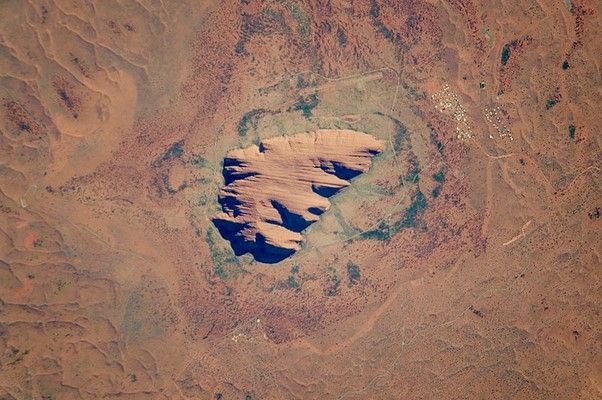Home/Curriculum resources/Communicating traditional Indigenous Knowledge/Activity 3 – Communicating traditional knowledge with images and diagrams
Learning Area:
English
Year level:
Level 6
Required resources:
Electronic or printed version of the Ngadju kala document, optional extension activity requires using the Ngadju seasonal calendar document

Activity 3 – Communicating traditional knowledge with images and diagrams
This activity is a part of the Communicating traditional Indigenous Knowledge resource.
Uluru from Above. Photographer: NASA/JSC Gateway to Astronaut Photography of Earth. Source: Wikimedia Commons. License: CC BY 2.0
In this activity, students will explore the multifaceted uses of fire in Ngadju culture, as portrayed in the Ngadju kala document.
Step by Step guide
Step 1 - Investigate relationships
Students will investigate the relationship between Ngadju uses of fire for social/cultural practices and for land management practices. Referring to the Ngadju kala document, they will read the text ‘Fire in the landscape’ (p. 39-41) and examine the diagram ‘Journey to a Ngadju gathering’ (p. 41). Students will list the uses of fire reflected in the diagram. And then write a paragraph describing one fire practice (eg. burning to flush out a kangaroo) and the purpose or multiple purposes it serves (such as providing food for the group and promoting new growth for animals).
Step 2: Extension
Students can refer to the Ngadju seasonal calendar document (p23) 0 to write a summary of the main events occurring in the landscape during each of the four seasons. Students can then describe the four seasons of the Western calendar and compare the main differences.
Related activities within this resources:

Inquiry-based learning questions
These inquiry-based questions are provided for flexible classroom use, allowing teachers to tailor discussion and reflections specific to their classroom needs.

Activity 1 – Different uses of fire
In this activity, students will compare their own experiences with fire usage to that of the Ngadju people as documented in the Ngadju kala publication, fostering a cross-cultural understanding of fire's diverse roles. They'll brainstorm, document, and explore specific examples, enhancing their appreciation of the multifaceted nature of fire in different cultures.
Suggested timing:
One lesson divided into two 20 minute blocks, with 10 minutes for whole class report back
Required resources:
Electronic or print version of the Ngadju kala document

Activity 2 – The story of how Ngadju got fire
In this activity, students will engage with the Ngadju kala document by reading and discussing the story of how fire was given to the Ngadju people, focusing on its unique language and cultural significance.
Suggested timing:
30 minutes, including whole class discussion
Required resources:
Electronic or print version of the Ngadju kala document